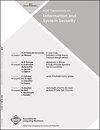实用遗忘外包存储
Q Engineering
ACM Transactions on Information and System Security
Pub Date : 2011-09-01
DOI:10.1145/2019599.2019605
引用次数: 10
摘要
在本文中,我们将介绍一种技术,在外包数据存储中保证访问模式隐私不受计算有限对手的影响,其通信和计算开销比现有方法好几个数量级。在存在少量临时存储(足以存储O(√n log n)项和id,其中n是数据库中的项数)的情况下,我们可以实现访问模式隐私,每个查询的计算复杂度小于O(log2 n)(与现有方法相比,例如,O(log4 n))。我们将基于数据变换算法的概率分析的新见解应用于遗忘RAM,从而实现了这些新颖的结果,使我们能够显着提高其渐近复杂性。这导致协议跨越了理论和实践之间的界限,并普遍适用于访问模式隐私。我们表明,在现成的硬件上,查询大型数据集的速度可以比现有工作快几个数量级。本文章由计算机程序翻译,如有差异,请以英文原文为准。
Practical Oblivious Outsourced Storage
In this article we introduce a technique, guaranteeing access pattern privacy against a computationally bounded adversary, in outsourced data storage, with communication and computation overheads orders of magnitude better than existing approaches. In the presence of a small amount of temporary storage (enough to store O(√n log n) items and IDs, where n is the number of items in the database), we can achieve access pattern privacy with computational complexity of less than O(log2 n) per query (as compared to, for instance, O(log4 n) for existing approaches).
We achieve these novel results by applying new insights based on probabilistic analyses of data shuffling algorithms to Oblivious RAM, allowing us to significantly improve its asymptotic complexity. This results in a protocol crossing the boundary between theory and practice and becoming generally applicable for access pattern privacy. We show that on off-the-shelf hardware, large data sets can be queried obliviously orders of magnitude faster than in existing work.
求助全文
通过发布文献求助,成功后即可免费获取论文全文。
去求助
来源期刊

ACM Transactions on Information and System Security
工程技术-计算机:信息系统
CiteScore
4.50
自引率
0.00%
发文量
0
审稿时长
3.3 months
期刊介绍:
ISSEC is a scholarly, scientific journal that publishes original research papers in all areas of information and system security, including technologies, systems, applications, and policies.
 求助内容:
求助内容: 应助结果提醒方式:
应助结果提醒方式:


